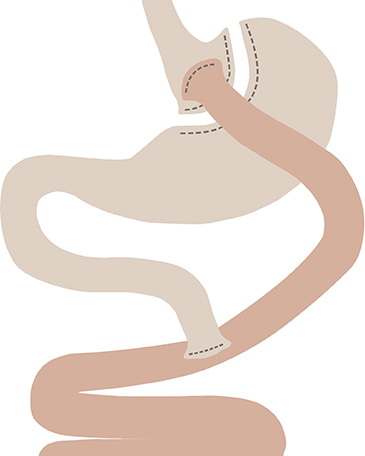Gastric bypass at Tunbridge Wells Hospital
A gastric bypass is a weight loss surgery procedure that uses both restrictive and malabsorptive elements. The result is you simply cannot eat as much and thus you absorb fewer calories.

What happens during gastric bypass?
- A gastric bypass is performed under general anaesthetic and usually takes between two and four hours
- Your surgeon will usually use laparoscopic (keyhole) surgery
- They will make several small cuts on your abdomen
- Your surgeon will place surgical instruments along with a telescope inside your abdomen to perform the operation
- Your surgeon will create a tunnel behind your stomach
- They will pass a stapling device through the tunnel and then staple your stomach to create a smaller stomach pouch
- They will divide your small bowel below your stomach and bring up the lower end and attach it to your new stomach pouch
- The contents of your new stomach pouch will now bypass the rest of your stomach and the first part of your small bowel.
Going home after gastric bypass
- You should be able to go home the day after your procedure
- Your stomach may be sore and you may experience nausea or vomiting
- These symptoms should ease quickly
- You will start with a liquid-only diet, progressing to soft food and then to solid food
- Due to nutritional deficiencies created by gastric bypass you may need dietary supplements for the rest of your life
- Some patients experience “dumping syndrome” if they eat the wrong foods; resulting in nausea, vomiting and diarrhoea
- You should be able to return to work after two to four weeks depending on the extent of surgery and your type of work
- Many patients experience rapid weight loss in the first 6-9 months following gastric bypass
- It is important that you maintain any diet or exercise programme prescribed in order to continue this progress.
What complications can happen?
General complications of any surgical procedure may include:
- Pain
- Bleeding
- Infection of the surgical site (wound)
- Unsightly scarring
- Developing a hernia in the scar
- Blood clots (deep vein thrombosis)
Specific complications of gastric bypass may include:
- Damage to internal organs
- Surgical emphysema
- Developing a hernia near one of the cuts
- Pouch stenosis
- Staple-line bleeding
- Anastomotic leak
- Developing a hernia inside the abdomen
- Change in bowel habit or diarrhoea
- Nutritional deficiencies
- Anastomotic ulcer
- Developing gallstones
The decision to have gastric bypass surgery must be considered very carefully. Our experienced consultants and bariatrics nurses can give you all the information you need.
Gastric bypass consultants at Tunbridge Wells Hospital
Kingswood Road, Tunbridge Wells, TN2 4UL
Ways to pay
Nuffield Health promise
Our prices are all-inclusive. We will equal any comparable price. There are no time limits on your aftercare.
Paying for yourself
There are no hidden costs in our treatment prices. The price you see is the price you pay.
Find out morePersonal medical loan
Spread the cost of your treatment with a 6, 10 or 12 month 0% personal medical loan.
Find out moreMedical insurance
We work with you and your insurance provider to get you the treatment you need quickly
Find out moreRelated free events
Meet our experts on Weight Loss Surgery
Friday 23 May 2025
Tunbridge Wells Hospital
Mr Midhat N Siddiqui, Consultant Upper GI and Bariatric Surgeon Mr Ahmed Hamouda
This free event is for anyone who is considering weight loss surgery and would like to explore options for treatment
Book your place now


